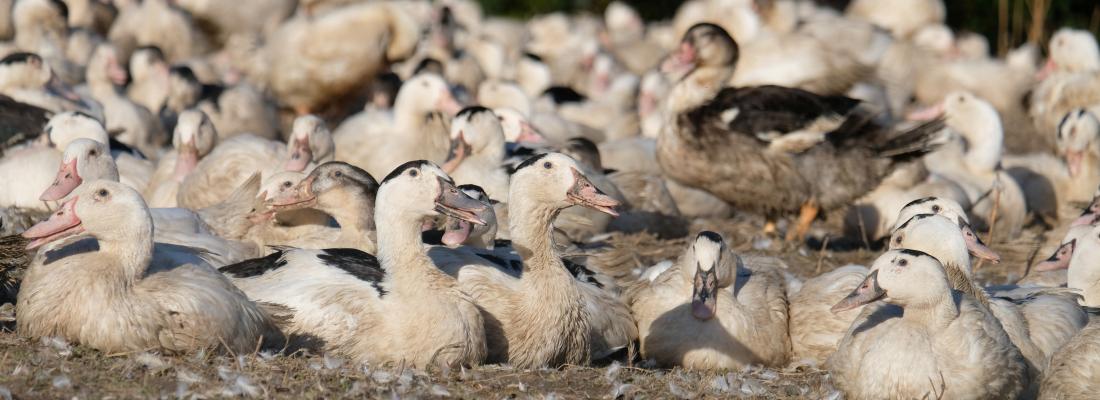Food, Global Health Reading time 2 min
Management of avian influenza in a vaccination context
Published on 04 September 2024

While outbreaks of highly pathogenic avian influenza (HPAI) in Europe used to be rare and geographically contained, the situation has dramatically changed in the last few years with thousands of outbreaks reported in domestic poultry and wild birds.
Although this is an area of research on which a large number of teams are working, many unknowns remain. How can we predict the emergence of HPAI, prevent viral spread and limit the socio-economic impact of control measures? Vaccination of domestic poultry against avian influenza is now being given full consideration, as it is becoming clear that traditional prevention and control approaches alone will not curb the accelerating pace of occurrence of devastating HPAIV epidemics.
On 1 October 2023, France became the first European Union country to implement a nation-wide vaccination campaign in ducks. However, vaccinating domestic poultry does not come without important epidemiological, virological and economic challenges.
The VIVACE project therefore aims to set up a doctoral network - 13 theses (PhD) funded, including 3 at the IHAP laboratory - to contribute to the full integration of poultry vaccination approaches into effective avian influenza management strategies.
Combining the disciplines of life sciences, epidemiology, mathematics and social and behavioral sciences, the project's objectives are to:
- analyze the impact of current and future EU vaccination policies on avian influenza virus evolution and the emergence of zoonotic strains;
- adapt surveillance strategies and develop improved diagnostic tools;
- assess the societal impact of HPAI by identifying factors influencing the effectiveness of control measures.
The proposed training program includes sessions to acquire scientific and transferable skills. It draws on the integrated added value of complementary expertise (virology, immunology, modelling, spatial and molecular epidemiology, social psychology, economics and politics), and on full access to cutting-edge technologies in excellent research teams and companies.
The consortium gathers 15 universities or research institutes and 5 private companies in 8 countries, securing both inter-sectoriality and wide geographic distribution with tailored epidemiological and vaccination contexts.
The project in a few figures:
- Financing: 3,1 M€
- Duration: 4 years start to 01/12/2024
- Partners: 20
- Countries: 8
Partners: Université Libre de Bruxelles (Belgium), Erasmus Universitair Medisch Centrum Rotterdam (Netherlands), Wageningen University (Netherlands), Institut agronomique et vétérinaire Hassan II de Rabat (Morocco), National Research Center de Giza (Egypt), Università Degli Studi Di Siena (Italy); and associated partners: University of Liverpool (UK), VisMederi SRL (Italy), CEVA Santé Animale SA (France), Institut national polytechnique de Toulouse (France), Ecole nationale vétérinaire de Toulouse – ENVT (France), Istituto Zooprofilattico Sperimentale delle Venezie (Italy), Stichting Wageningen Research (Netherlands), Sciensano (Belgium), Human Link (Lebanon), Universiteit Utrecht (Netherlands), Ain Shams University (Egypt), Biosellal (France), INRAE Transfert (France)
INRAE laboratory involved: Host-Pathogen Interactions Laboratory (IHAP – INRAE/ENVT) with project co-coordinators Mariette Ducatez (INRAE), Timothée Vergne (ENVT) and Romain Volmer (ENVT)

This project has received funding from the European Union’s Horizon Europe Research and Innovation Actions programme under grant agreement N°10116776.
